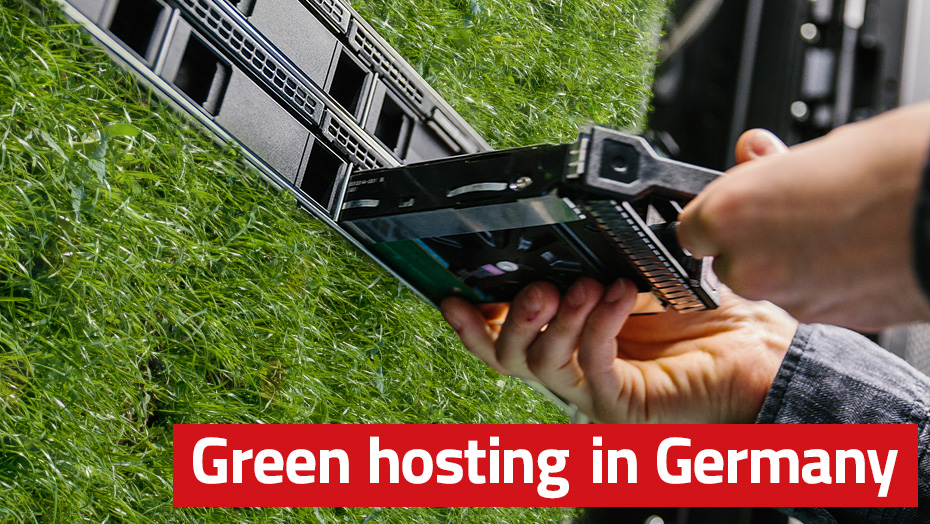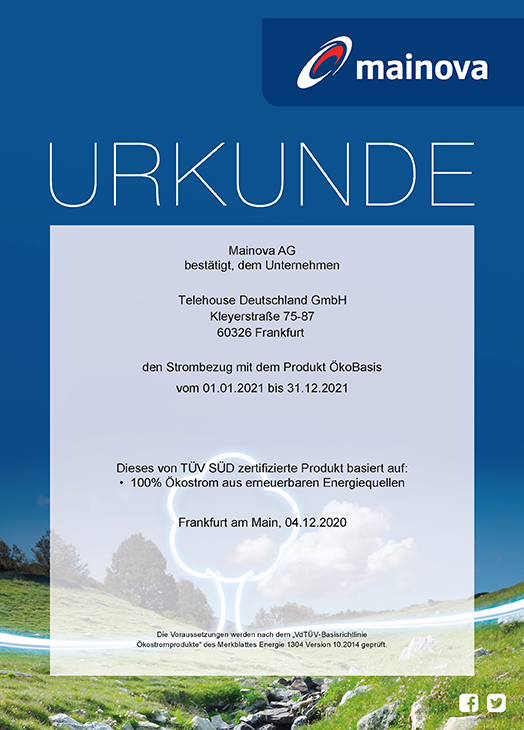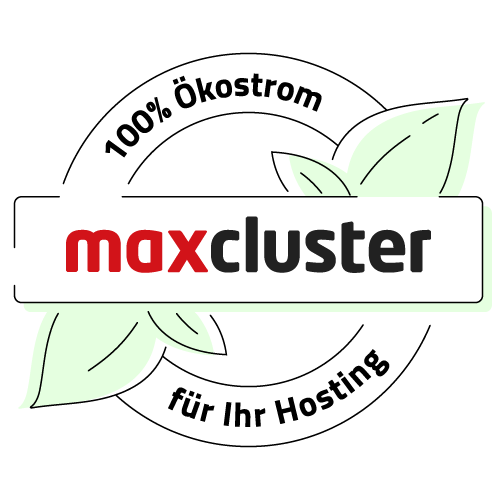This article was originally published at an earlier date. Please check whether the information it contains is still up-to-date, as trends and developments in e-commerce can change quickly.
Sustainable hosting in Germany

If you type "sustainable hosting" into Google, the search engine throws up 940,000 entries within 0.55 seconds. Whether it is due to the "Fridays for Future" movement or the general increase in awareness of ecological issues - sustainable hosting is increasingly coming into focus. But what is actually meant by this and what measures are we taking at maxcluster to give our customers a clear green conscience? We explore these questions in our blog post.
Whether it's an e-commerce shop, financial transactions or "just" cat videos - all content produced will sooner or later be stored in a data centre so that users can access it anytime, anywhere. This makes data centers not only indispensable for global connectivity, but also the biggest energy consumers worldwide.
Data centres as energy consumers
A few figures: According to the German Association for Information Technology, Telecommunications and New Media (Bitkom), there were about 50,000 data centres in Germany alone in 2015. (Bitkom), there were about 50,000 data centres in Germany alone in 2015. The consumption of these data centres is estimated at 9.1 terawatt hours of electricity, an output that could supply around 2.6 million households with electricity (source). The Borderstep Institut für Innovation und Nachhaltigkeit gemeinnützige GmbH, on the other hand, puts the electricity demand much higher at 12.4 billion kilowatt hours in 2016 (source). The eco-label "Der Blaue Engel" assumes that data centres in Frankfurt are responsible for about 20 % of the city's electricity consumption (source).
Although awareness of green IT has not only increased since Greta Thunberg (the Energy Star label was launched by the EPA as early as 1992), the trend continues to rise. By 2025, the annual electricity consumption of servers and data centres in Germany is expected to reach 16.4 billion kWh/a.
In the future, the causes of the increased electricity consumption will essentially be determined by IT components such as storage, servers and networks. While these IT components used to account for just under half of the electricity demand of data centres, their share is now visibly increasing. According to Bitkom, the reason for this is the rising electricity demand for data storage, the importance of which will increase even more as digitalisation progresses. But the infrastructure, such as the uninterruptible power supply (UPS), the air conditioning and the transformers - all components that are indispensable for the trouble-free provision of computing power from the centre - also have a significant share in the total consumption.
According to Bitkom, however, the power consumption of the infrastructure will continue to decline in relation to the power consumption of the IT systems.
It is obvious that the operation of data centres is very energy-intensive and consequently accounts for a large share of Germany's total electricity consumption and is therefore also responsible for a high level of CO2 emissions. This is where sustainable hosting or green hosting comes in.
The foundation for sustainable hosting
Sustainable, green hosting should not be limited to the use of green electricity, but go beyond that. Electricity from hydroelectric power or from renewable energies such as wind power are self-evident measures in the reduction of CO2, because these energies are used without generating CO2 and also do not consume fossil energy sources. However, it is not only the electricity that flows in the cables that is important for sustainable hosting, but also its reduction.
If the Blue Angel has its way, additional energy-saving potential can be exploited through professional management of the data centre components and building technology by better utilising the technology used. Overcapacity of the infrastructure and underutilised servers waste valuable raw materials, which can be optimised through efficient monitoring of the individual components and the use of energy-efficient technology.
The following points are therefore the basis for sustainable hosting:
- Reduce CO2 emissions
- Using renewable resources for power generation
- Use of energy-efficient technology
- Optimal utilisation of the technology used
- Efficient use of valuable raw materials
What are the options for sustainable hosting?
Unfortunately, it is not possible to apply the virtual power consumption pencil to all hosting components, because the production of cases, racks, cables and the like, as well as the transport of components to the centres, will continue to involve CO2 emissions and power consumption.
But the servers and parts of the infrastructure, such as emergency generators and air conditioning, can be operated in a sustainable and power-saving way, so there are some options for hosters and data centre operators to offer their service as sustainably as possible:
Reducing energy consumption in data centres
Data centre cooling is at the forefront of many measures for potential savings. There are various concepts for energy reduction, such as room, rack and row cooling. And the type of cooling can also be considered under the aspect of efficiency: Air cooling or liquid cooling make air-conditioning systems partly obsolete. With all cooling measures, comprehensive insulation and thermal protection are of course basic prerequisites. It must also be checked whether the use of energy-efficient technology in the infrastructure results in further savings potential.
Use of renewable energies for power supply
In general, data centre operators should increasingly or even exclusively use natural or green electricity. The waste heat generated by the operation of a data centre should also be included in the energy concept. If this cannot be used, e.g. to heat one's own offices, it can be fed into the district heating network and is thus available to other users or is stored there in a sustainable manner.
Use of energy-efficient hardware
The Blue Angel, the best-known eco-label, mentions various savings potentials for hardware in data centres. For example, it points out that existing hardware should be used efficiently. With regard to a resource-efficient economy, the aim should be that computers and servers can be used for a long time in order to get the maximum benefit from the scarce and valuable raw materials once used. Of course, in all efforts to be resource-efficient, an analysis must also be made as to whether "old" systems can guarantee the performance and security of the hosted websites. Modern and energy-efficient hardware also often brings considerable advantages over older server technology and thus saves energy.
Virtualisation
Virtualised infrastructures support the efficient utilisation of existing technology, because the hardware is better utilised through automated resource distribution. Several servers can be operated on one physical hardware, so that energy-guzzling idle times are kept to a minimum.
Sustainable hosting at maxcluster
We at maxcluster have been committed to sustainability not only since thousands of people took to the streets on Fridays to demonstrate for a rethink in the climate debate. As a company in which family friendliness is enshrined in the values, it is also natural for us to be committed to climate protection and sustainability.
With our sustainable hosting, we want to support our customers in making a contribution to sustainability and environmental friendliness through their choice.
Our servers are located in a data centre in Frankfurt that is powered by natural electricity. The Frankfurt-based electricity provider Mainova generates 100% of the electricity for the data centre from renewable/regenerative energies and obtains the resources exclusively from certified energy sources. Our clusters therefore run on 100 % CO2-neutral electricity.

In addition, our racks are completely enclosed to enable cold containment. This achieves a strict separation of hot and cold air areas and thus optimises cooling in the data centre.
But it is not only in the data centre that we focus on environmental awareness and sustainability, but also at our company headquarters in Paderborn: we get our electricity from WestfalenWIND Strom GmbH. The conscious use of energy is a matter of course for us and, for example, timers help us to switch off lamps if we have been too forgetful. Of course, we are aware that the technology we use, such as monitors, laptops and desktops, consume quite a bit of energy, but we try to reduce this by using short-term standby modes as long as we are working on the computers - afterwards, they are switched off as a matter of course.
We only print centrally and only when paperless is not possible. This not only saves energy, but also valuable raw materials.
And very important: we get our coffee from a local roastery - not only to keep transport distances short, of course, but also because it tastes fantastic 😄.
In order to raise awareness for sustainability and the possibilities of green hosting, we now also offer our customers a sustainability logo for use on the respective website or shop. In this way, they can also show the outside world that they operate their shops with a sustainable hoster. This in turn can lead to increased acceptance of the customer's products or services, so that not only the environment but also the shop operator benefit.
Last updated on 14.09.2021 | NM
You have questions, requests, criticism, suggestions or just want to tell us your opinion about our blog? Here you have the opportunity to contact us directly.
Send e-mail
 The new maxcluster logo for CO2-neutral hosting
The new maxcluster logo for CO2-neutral hosting